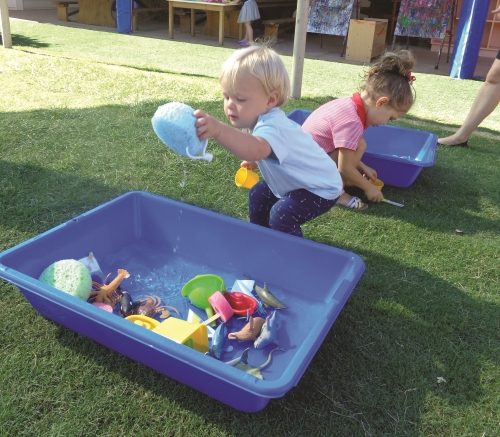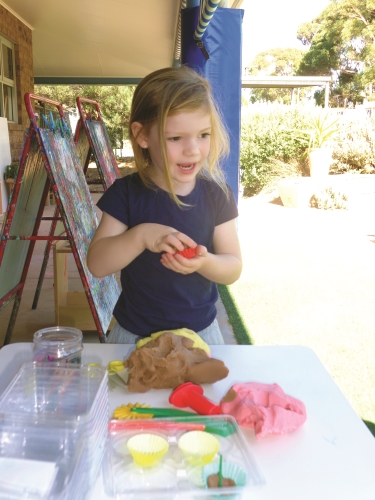Ages, Stages and Playgroup
Wednesday, December 13, 2017
It’s not news that children love to play and that play is important for children’s development. But how does Playgroup benefit children of different ages and stages?
The period between birth and seven is the most rapid stage of brain and skill development. Young children’s minds are like sponges, ready and able to absorb more information that we give them credit for. So what does Playgroup provide to babies, toddlers and pre-schoolers in terms of brain development? Clearly Playgroup provides a wide variety of early learning experiences that serve to enrich development. But what are the specifics?
Babies and Playgroup
From the moment a child is born, they are learning and absorbing everything around them. Playgroup provides babies aged 0-1 years a wide variety of quality play experiences that enhance their development. Stimulating objects for babies include things to look at, music or sounds to listen to and objects that babies can touch and feel. See the lists below for specific ideas. Young babies learn by watching others too. At Playgroup babies are given the opportunity to be around other babies, children and adults. They can learn social behaviours; explore a fun and safe environment and practice skills such as rolling, crawling and walking, with the benefit of learning by observation. There are particular things to consider when setting up play spaces for babies at Playgroup. A play area needs to include materials and toys that meet baby’s sensory, physical and social developmental needs. This might include:
Visual stimulation such as:
- Mobiles with bright colours and different objects
- Picture books with bright colours or sparkling textures
- Rattles and toys with moving parts
- Mirrors (play peek-a-boo) and watch facial expressions
Other children Things to listen to:
- Talk to your baby as though they understand. This encourages language development and is socially and emotionally beneficial for their development
- Sing nursery rhymes and play music. It’s a good idea to share a regular music time together
- Shakers are simply made by placing split peas or rice into a transparent small plastic bottle and permanently seal the lid
Objects to touch and feel:
- Textured fabrics or material could include satin, velvet, corduroy, fleece, touch and feel books with fur, bumpy, rough or smooth textures
- A variety of good quality baby toys
- Move different parts of your face or body for baby to copy, such as fluttering eyelids, open and closing mouth, poking out tongue and clapping hands
- Mobiles on a frame with dangling objects for baby to practice swiping and grabbing
- You can also play with their hands and feet
- Place objects just out of baby’s reach on a rug on the floor to encourage them to move, this can be using tummy time or while baby is on his/her back, or while baby is sitting up. A medium sized soft rubber ball that rolls away when baby touches encourages movement too
- Simple blocks. Babies like to knock things down! It also encourages them to learn coordination, develop their motor skills and begin to problem solve.
Toddlers and Playgroup

Toddlers are on the move! They are full of energy and ready to take on the world. Providing quality play experiences for toddlers at Playgroup will equip them with that next level of learning and engagement with the world and those around them. Language and social development are key features of toddlerhood and Playgroup provides the perfect opportunity to practice these skills.
Toddlers have a strong desire to be independent and learn to do things for themselves. Playgroup gives them this opportunity to blossom and establish their identity, build confidence and form lifelong friendships. Playgroup also provides toddlers with routine and structure, something they benefit from and crave. Toddlers respond well to clear Playgroup guidelines and routines such as sitting when eating and the no hat, no outside play rule. Activities with a strong focus on movement and gross motor skills are important for toddlers too, as they are physically developing at a rapid rate and need play experiences that allow them to practice these skills.
Activities for toddlers can include:
- Pasting and sticking. Toddlers will glue pieces of paper or material on top of each other in layers and without structure. This is good for them. They need the practice of pasting things together to develop their motor skills and coordination
- Tearing paper and stuffing . This is good for developing toddlers’ muscles. Toddlers can practice screwing up the pieces and stuffing them into a stocking or sock
- Finger painting. Toddlers love to finger paint. Set up an easel or table that toddlers can easily reach and encourage them to use their imaginations
- Messy play. Toddlers love to run their fingers through food, gloop and slime! They love exploring different textures and this is very important for development of their senses as well as motor skills and non-verbal expression
- Sand and water play. Toddlers enjoy exploring sand and water play. Provide materials and utensils for toddlers to play with. Toddlers can learn numeracy skills by measuring, counting and distributing sand and water into different sized containers
- Pretend play. Provide home corner toys and dress-ups. Toddlers can learn many social skills through imaginative play. This play also assists toddlers to develop self-help skills and begin learning to share and take turns
- Push and pull-along toys. Prams and trolley carts are excellent for promoting walking skills
- Outdoor play. Toddlers can learn to take risks outdoors as they are monitored by their parent/ caregiver. They are able to explore nature and develop skills through running, climbing, jumping, stepping stones and with music and movement activities
- Language and problem solving. This is especially important for developing speech and critical thinking. This can include storytelling, puppet play, singing, rhymes and puzzles
Preschoolers and Playgroup
 Playgroup offers pre-schoolers quality play experiences that are targeted at their more advanced skill development. Pre-schoolers are more coordinated and skilled at running, climbing, throwing and catching. Pre-schoolers may also be able to use play tools, hold crayons with their fingers (not fists), and demonstrate improved hand-eye coordination and fine motor skills.
Playgroup offers pre-schoolers quality play experiences that are targeted at their more advanced skill development. Pre-schoolers are more coordinated and skilled at running, climbing, throwing and catching. Pre-schoolers may also be able to use play tools, hold crayons with their fingers (not fists), and demonstrate improved hand-eye coordination and fine motor skills.
Pre-schoolers need opportunities to practice all of these skills and Playgroup is a fantastic place for them to do this.
You will notice that pre-schoolers transition from parallel play (toddlers generally play side by side with little interaction) to cooperative play; this often includes interactions of imitating, planning and executing a plan together, sharing and negotiating. At Playgroup you can provide activities to assist preschoolers in practicing all of their fast developmental advances.
Activities at Playgroup for preschoolers can include:
- Provide a making table with activities for make and play
- Introduce natural materials. Go on a Playgroup Nature Walk to collect items
- Play simple group games, such as follow the leader and Simon Says.
- Invite pre-schoolers to help set up and create stations for an obstacle course.
- Introduce more complex sorting, classifying, counting, estimating, weighing, predicting and evaluating activities
- Vary the colours or shades of the playdough. Teach pre-schoolers how to mix colours together to make different colours.
- Your discovery table can include an atlas/globe, magnifying glass and clocks, and egg timers
- Books with rhymes and rhythm. This can include music and movement activities
- Cubby houses for pretend play building skills like teamwork, negotiation, problem solving and language
Words by Natalie Francis
This article was originally published in State of Play, Issue One, March 2016
